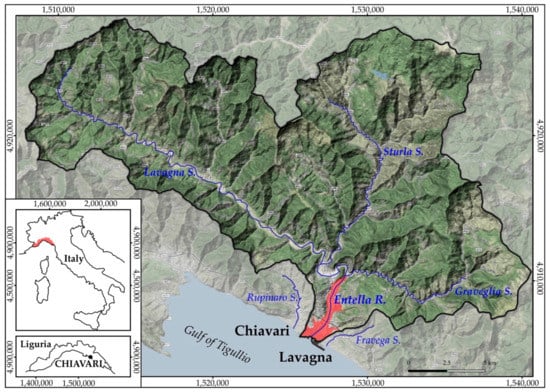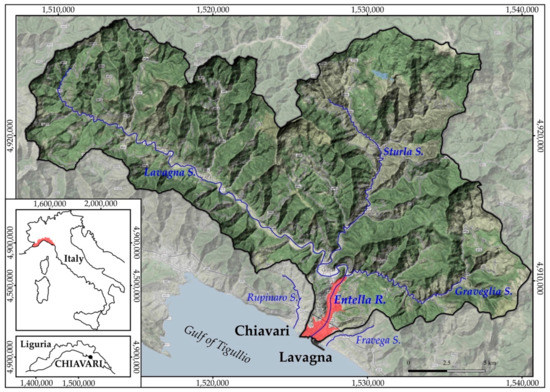Flash flooding affects the high ground, low ground and any other ground for those unlucky enough to be beneath a months' worth of rain condensed into a few hours. Flash flooding and flooding in general has been getting worse this last decade. Horrific.I originally asked how much of these problems are due to building on land previously thought unsuitable
Climate Refugees
- Thread starter diy_fun_uk
- Start date
- Joined
- 22 Jan 2007
- Messages
- 19,633
- Reaction score
- 2,649
- Country

That wasn't always the belief. Gut feelings obviously weren't tuned in way back when...You don't need science or gut feelings to know not to build on land prone to flooding.
- Joined
- 22 Jan 2007
- Messages
- 19,633
- Reaction score
- 2,649
- Country

Here's just one from some more idiots on how knowledge grew through time.You don't need science or gut feelings to know not to build on land prone to flooding.

Historical Geomorphological Research of a Ligurian Coastal Floodplain (Italy) and Its Value for Management of Flood Risk and Environmental Sustainability
The alluvial plain of the Entella River (Eastern Liguria), historically affected by damaging flood events, has been heavily modified over the past 250 years by human activity and natural processes. A qualitative and quantitative analysis of the morphological and land use evolution of the Entella...
- Joined
- 22 Aug 2006
- Messages
- 6,286
- Reaction score
- 866
- Country

If you look at the countries most vulnerable to climate change, which I referred to, their troubles are nothing much to do with building on flood plains. That's a 'bugger all' in the scheme of things, raised by a silly internet troll who posts the irrelevant, the obvious, and the junk.
Climate is never constant but it changes slowly enough that ways of life can normally adapt to it. What's happening now is the rate of change being so high that people can't adapt.
If somewhere has to put in new flood defences over a period, that's not a big deal at all. Having the seasonal rains suddenly stop, or sea storms crashing over the islands your people have inhabited for centuries, several times a year, is different. That makes you a refugee because you have to live somewhere else, like a different country.
Climate is never constant but it changes slowly enough that ways of life can normally adapt to it. What's happening now is the rate of change being so high that people can't adapt.
If somewhere has to put in new flood defences over a period, that's not a big deal at all. Having the seasonal rains suddenly stop, or sea storms crashing over the islands your people have inhabited for centuries, several times a year, is different. That makes you a refugee because you have to live somewhere else, like a different country.
D
Deleted member 18243
Where has this happened? Where did the refugees go?Having the seasonal rains suddenly stop, or sea storms crashing over the islands your people have inhabited for centuries, several times a year, is different. That makes you a refugee because you have to live somewhere else, like a different country.
That's a detailed report filled with science in dense blocks of small text; not a quick and easy read for me unless i put on my glasses and find time to go through it. Have you read enough of it to provide a synopsis?Here's just one from some more idiots on how knowledge grew through time.

Historical Geomorphological Research of a Ligurian Coastal Floodplain (Italy) and Its Value for Management of Flood Risk and Environmental Sustainability
The alluvial plain of the Entella River (Eastern Liguria), historically affected by damaging flood events, has been heavily modified over the past 250 years by human activity and natural processes. A qualitative and quantitative analysis of the morphological and land use evolution of the Entella...www.mdpi.com
You can if the building is designed to accommodate potential flooding.You don't need science or gut feelings to know not to build on land prone to flooding.
- Joined
- 22 Aug 2006
- Messages
- 6,286
- Reaction score
- 866
- Country

You're trolling again. You happy to pop your house on stilts just in case you get unheard-of floods?You can if the building is designed to accommodate potential flooding.
- Joined
- 22 Jan 2007
- Messages
- 19,633
- Reaction score
- 2,649
- Country

Here's the abstract,That's a detailed report filled with science in dense blocks of small text; not a quick and easy read for me unless i put on my glasses and find time to go through it. Have you read enough of it to provide a synopsis?

Historical Geomorphological Research of a Ligurian Coastal Floodplain (Italy) and Its Value for Management of Flood Risk and Environmental Sustainability
The alluvial plain of the Entella River (Eastern Liguria), historically affected by damaging flood events, has been heavily modified over the past 250 years by human activity and natural processes. A qualitative and quantitative analysis of the morphological and land use evolution of the Entella...
The point being, for Andy's sake, is that there is more to life than following your gut feeling. Sometimes people investigate things, detail their findings, propose/suggest recommendations/solutions from their findings and perhaps refine things as new discoveries are found.
@andy11 thinks people that do that, and produce outcomes which can be scrutinised, are "idiots" though.
- Joined
- 22 Aug 2006
- Messages
- 6,286
- Reaction score
- 866
- Country

Anything objective or which doesn't agree with Andy's guts, or meagre understanding, is a conspiracy.The point being, for Andy's sake, is that there is more to life than following your gut feeling. Sometimes people investigate things, detail their findings, propose/suggest recommendations/solutions from their findings and perhaps refine things as new discoveries are found.
@andy11 thinks people that do that, and produce outcomes which can be scrutinised, are "idiots" though.
You can if the building is designed to accommodate potential flooding.
There are numerous maisonettes built above garages, often with just the bare minimum on the ground floor.You're trolling again. You happy to pop your house on stilts just in case you get unheard-of floods?
Have you never heard of coach houses?
And yes, I'm happy "pop my house on stilts just in case I get unheard-of floods" on a flood plain.
Thanks, now i see where you mean. I wondered if it was north of Rome which i read had been marshland drained in the time of Claudius, around 40AD and he also widened the river leading to the harbour at Ostia to increase cargo to Rome. You can still see the channels, silted up and full of grass, nowadays. That looks to be further north but on the opposite side is the Venetia where the Veneti, fleeing Lombards and Goths, set up a safe colony in the lagoon by driving thick wood piles into the soft mud and building what were in effect Crannogs.Here's just one from some more idiots on how knowledge grew through time.

Historical Geomorphological Research of a Ligurian Coastal Floodplain (Italy) and Its Value for Management of Flood Risk and Environmental Sustainability
The alluvial plain of the Entella River (Eastern Liguria), historically affected by damaging flood events, has been heavily modified over the past 250 years by human activity and natural processes. A qualitative and quantitative analysis of the morphological and land use evolution of the Entella...www.mdpi.com
These days we call it Venice.
Maybe not so mad an idea to build on a floodplain if you manage the flow of water effectively.
Last edited:
The only problem with Venice is the mud and foundations.These days we call it Venice.
Maybe not so mad an idea to build on a floodplain if you manage the flow of water effectively.
Maybe it's the added weight of the tourists as well.
And the smell.The only problem with Venice is the mud and foundations.
Maybe it's the added weight of the tourists as well.

Similar threads
- Replies
- 88
- Views
- 9K
- Replies
- 73
- Views
- 6K
